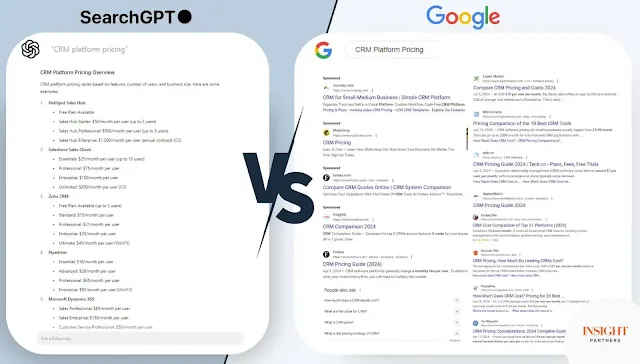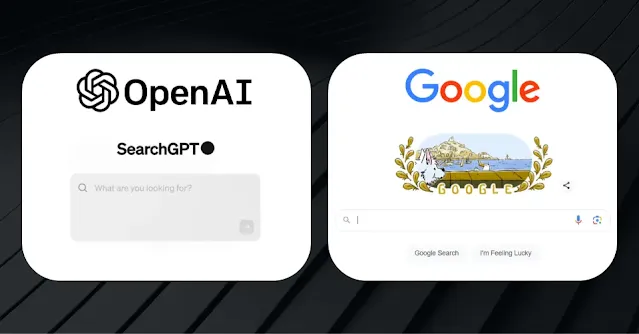SearchGPT vs. Google: An In-Depth Comparison for 2024
In the ever-evolving digital landscape, search engines are the cornerstone of our daily online experience. Google has long reigned as the king of search, powering billions of queries every day. However, the rise of AI-driven tools like SearchGPT is changing how we interact with information online.
This article provides a comprehensive comparison of SearchGPT and Google, helping you understand their strengths, weaknesses, and the scenarios in which each excels. If you're looking to choose the best search tool for your needs, this guide offers expert insights backed by the latest research and statistics.
What is SearchGPT?
SearchGPT is an AI-powered search tool built on the advanced GPT-4 architecture, developed by OpenAI. Unlike traditional search engines, which rely on indexed databases to deliver results, SearchGPT uses Natural Language Processing (NLP) to generate conversational responses.
This allows it to provide nuanced answers that go beyond the capabilities of traditional search engines like Google.
- Conversational Search: Engages users in a dialogue, making it ideal for complex, multi-step queries.
- Contextual Understanding: Retains the context of previous interactions, offering more coherent and relevant responses.
- Content Generation: SearchGPT can generate creative content, making it a valuable tool for content creators, marketers, and researchers.
"SearchGPT represents a significant shift in how we approach search, focusing on user interaction and contextual relevance rather than just delivering a list of links." – TechCrunch
For a deeper dive into how GPT-4 technology works, check out this comprehensive guide on OpenAI's GPT-4.
What is Google?
Google is the most widely used search engine globally, processing over 3.5 billion searches per day. Its powerful algorithms, including the recent MUM update (Multitask Unified Model), allow it to understand complex queries and provide highly relevant results.
Google's dominance in the search engine market is a testament to its continuous innovation and ability to adapt to user needs.
- Algorithmic Precision: Google’s search algorithms are designed to deliver the most relevant results based on a user's intent, leveraging AI and machine learning to improve accuracy.
- Diverse Search Results: From web pages and images to news and local businesses, Google offers a wide variety of search results tailored to user preferences.
- Integration with Google Ecosystem: Google Search seamlessly connects with other Google services like Maps, Gmail, and YouTube, enhancing user experience.
"Google’s ability to deliver accurate, fast, and diverse results is unmatched, making it the go-to tool for billions of users worldwide." – Search Engine Journal
Learn more about Google’s latest MUM update and how it’s transforming search at Search Engine Land.
SearchGPT vs. Google: A Detailed Comparison
1. Search Experience
SearchGPT: SearchGPT offers a conversational search experience, engaging users in a dialogue that can handle complex and multi-step queries. This makes it particularly useful for research and content creation, where understanding context is key.
For small businesses looking to leverage SearchGPT for their SEO strategies, check out our Implementing SearchGPT for Small Business SEO (Step-by-Step Guide).
Google: Google excels in providing fast and comprehensive search results. Its familiarity and ease of use make it the preferred choice for everyday searches, where quick access to information is crucial.
For a comparative analysis of SearchGPT and traditional SEO tools, read our detailed article on SearchGPT vs. SEO Tools: What’s Best for Small Businesses?.
2. Accuracy and Relevance of Results
SearchGPT: SearchGPT’s AI-driven approach allows it to generate contextually rich responses. However, its accuracy can sometimes be less precise than Google’s, especially for well-documented and frequently searched topics.
Discover how SearchGPT can enhance your business's SEO efforts in our article on Top 10 Benefits of SearchGPT for Small Businesses in 2024.
Google: Google’s vast database and refined algorithms ensure highly accurate results. The introduction of the BERT and MUM models has further enhanced its ability to understand user intent, making it the leader in delivering precise and relevant search results.
Stat: Google processes 15% of daily queries that have never been searched before, showcasing its ability to handle new and unique search requests with precision.
3. Speed and Efficiency
SearchGPT: While SearchGPT offers detailed and nuanced responses, this comes at the cost of speed. Generating conversational replies can take a few moments longer than retrieving a list of search results.
Google: Google’s speed is unparalleled, delivering results in milliseconds. This efficiency is crucial for users who need quick answers or are browsing through multiple sources.
4. Privacy and Data Security
SearchGPT: SearchGPT is designed with user privacy in mind, minimizing data retention and prioritizing user security. However, as with any AI tool, it’s essential to understand the terms and conditions related to data usage.
Google: Google has faced significant scrutiny over its data collection practices. According to a 2023 survey by Pew Research, 72% of internet users are concerned about how Google uses their data for personalization and advertising.
Read more about Google’s data privacy practices in this report by The New York Times.
5. Integration with Other Tools
SearchGPT: SearchGPT is still in its early stages of development, with ongoing efforts to expand its integration with other tools and platforms. It’s currently best suited for users who need creative and content-driven solutions.
For insights on how SearchGPT is transforming small business marketing, visit our article on How SearchGPT is Transforming Small Business Marketing.
Google: Google’s integration capabilities are extensive. From Google Analytics to Google Workspace, its ecosystem enhances productivity and offers seamless connectivity across various tools and services.
Stat: As of 2024, Google Workspace has over 6 million paying businesses, underscoring its importance in the professional environment.
Which One is Best for You?
For Everyday Searches: Google remains the top choice for quick, accurate, and broad searches. Its speed and efficiency make it ideal for finding immediate answers or accessing a wide range of resources.
For Specialized Queries: SearchGPT is the better option for handling specialized or complex queries, where context and conversation are essential. Its ability to generate content and provide detailed explanations makes it a powerful tool for researchers, writers, and marketers.
For Professional or Business Use: Google’s integration with tools like Google Analytics and My Business makes it indispensable for professionals and businesses. However, SearchGPT’s capabilities in content generation and creative brainstorming offer a unique edge for marketers and content creators.
For Creative and AI-Driven Tasks: SearchGPT excels in creativity and content generation, making it the go-to tool for tasks that require AI-driven innovation and nuanced understanding.
User Testimonials and Case Studies

Case Study: Boosting Content Production with SearchGPT

A leading digital marketing agency integrated SearchGPT into their content creation process, resulting in a 30% increase in productivity. By using SearchGPT to generate initial drafts and ideas, the agency was able to streamline their workflow and focus on refining and personalizing content, leading to faster turnaround times and higher client satisfaction.
User Testimonial
"Since incorporating SearchGPT into our workflow, we’ve seen a significant boost in content quality and efficiency. It’s like having a virtual assistant that understands our needs and delivers exactly what we’re looking for." – John D., Marketing Director
"SearchGPT is a game-changer for content creators. Its ability to understand context and provide detailed, relevant responses has streamlined our content production process." – Content Marketing Institute
"Google's algorithms continue to set the standard for search accuracy and speed. It's the first tool I turn to for any search query." – Search Engine Journal
Comparative Example
In a side-by-side comparison, users tasked with researching a complex legal topic found that while Google provided a comprehensive list of resources, SearchGPT offered a synthesized explanation that made understanding the topic easier without having to sift through multiple articles.
For more detailed information on integrating SearchGPT into your workflow, visit our SearchGPT User Guide.
Conclusion
In the battle of SearchGPT vs. Google, there is no one-size-fits-all answer. Each tool has its strengths and is suited for different types of searches. Google is unbeatable in speed, efficiency, and comprehensive results, making it the go-to for most users.
On the other hand, SearchGPT shines in creative tasks, detailed content generation, and handling complex queries that require a conversational approach. For professionals and businesses, integrating both tools into your workflow can provide the best of both worlds.
As we move further into 2024, the evolution of search technology will likely continue to shape how we find and interact with information online. Whether you choose Google, SearchGPT, or a combination of both, staying informed about their developments will ensure you’re always equipped with the best tools for your needs.
Additional Resources
FAQs on SearchGPT vs. Google
The primary difference lies in their approach to delivering results. SearchGPT, powered by AI and natural language processing, engages users in a conversational manner, offering context-rich, nuanced responses. It’s particularly effective for complex queries and content generation. Google, on the other hand, uses powerful algorithms to index and retrieve vast amounts of information quickly, providing a list of links ranked by relevance. Google is ideal for everyday searches where speed and accuracy are paramount.
While SearchGPT excels in handling complex, multi-step queries and generating creative content, it may not fully replace Google for everyday searches. Google’s speed, accuracy, and extensive database make it the go-to choice for quick, straightforward queries. SearchGPT is better suited for tasks that require detailed explanations or creative solutions rather than quick fact-finding.
SearchGPT’s accuracy depends on the nature of the query. It shines in providing contextually rich responses for complex queries but may lack precision for well-documented topics where Google excels. Google’s sophisticated algorithms ensure highly accurate results for a wide range of search queries, especially those that are common and well-researched.
For small businesses, the choice depends on the specific needs. Google offers powerful tools like Google My Business and Google Analytics, which are essential for local SEO and understanding customer behavior. However, SearchGPT can be a game-changer for content creation, marketing, and handling customer queries with its conversational abilities. For a more detailed comparison, see our article on SearchGPT vs. SEO Tools for Small Businesses.
SearchGPT is designed with privacy in mind, minimizing data retention and prioritizing user security. It generally collects less data compared to Google, which has faced scrutiny over its extensive data collection practices. Google uses this data to personalize search results and target ads, which raises concerns for some users. Understanding the privacy policies of both tools is crucial, especially for businesses handling sensitive information. For more details, check out our guide on Google's data privacy practices.





This comparison is really useful! It’s great to see how SearchGPT stacks up against Google, especially with the advancements in AI. The pros and cons outlined help in choosing the right search tool for my needs. Thanks for providing such a detailed analysis.
ReplyDeleteExcellent Explanation 👍
ReplyDeleteGreat article! The comparison between SearchGPT and Google is very thorough and insightful. I appreciate the detailed analysis of each tool's strengths and weaknesses. It really helped clarify which search tool might be better suited for different needs. Thanks for the valuable information!
ReplyDeleteInteresting comparison between SearchGPT and Google! It’s helpful to see the pros and cons laid out for each tool. I’m curious to explore how SearchGPT stacks up in real-world use. Thanks for the detailed review!
ReplyDelete